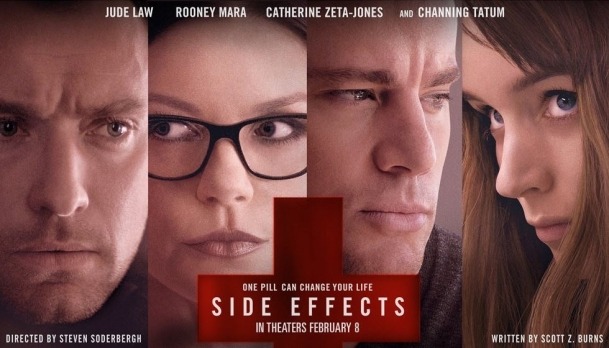Who doesn’t enjoy a good plot twist? Well, if you’re looking for one, Side Effects may be the movie you need to catch this weekend. Rooney Mara plays Emily Taylor, a mentally struggling wife of Channing Tatum’s Martin Taylor, who is arrested and sent to jail soon after their marriage. To handle the grief and her history of depression, a psychiatrist, Dr. Banks, played by Jude Law, prescribes a couple different drugs for Emily, who manifests unusual side effects as a result. But Dr. Banks’ investigation into Emily’s case and relationship with her former psychiatirst, Dr. Erica Siebert, played by Catherine Zeta-Jones, reveals a chain of deception that goes deeper than Manti Te’o’s love life.
The title of the movie has multiple meanings once the plot unfolds, the most meaningful of which has nothing to do with prescription drugs. The first half focuses on Emily’s life and the dazed state she lives in, before and after her husband’s incarceration. The minimal soundtrack and Mara’s stoic acting give the viewer a convincing idea of what clinical depression must feel like. The second half of the film centers around Dr. Banks and his obsession with Emily’s condition. His research and fascination consumes his life as he loses his job over it and any ability to keep a healthy relationship of his own. Instead of Watson, Jude Law becomes a zealous Sherlock Holmes-esque character, sans the witty humor and combat skills. It’s in this half of the film that the viewer starts to question each character’s motives, and who really is innocent. Unfortunately, all the plot twists come crammed into the last 30 minutes of the film, giving a rushed feeling after building up such a detailedstory in Emily Taylor.
The acting all around was exceptional. The dialog at a few choice times was awkward and unrealistic but not too distracting from the plot. Mara’s vapid looks and uncomfortably calm voice served well for her character’s mental state. Jude Law never seemed to fit in as the perfect actor for Dr. Banks’ role but nevertheless played the “strictly business” psychiatrist well. It was notable to see Catherine Zeta-Jones play an older character than usual who had something to hide. As for Channing Tatum, sorry ladies, he has a very minor, unmemorable role in the film.
The film also brings a couple interesting issues to mind concerning our society, specifically advertising and the field of mental health. Throughout the film, well known brands in America (Victoria’s Secret, Apple, Zoloft, etc) get several plugs ranging from the subtle (an extended shot of a green, unlabeled Heineken bottle) to the obvious (zoom in on ads on the internet). Either the producers made a load of money off of the advertisers or the film is trying to provide social commentary on the inescapable and annoying aspects of corporate advertising. As for the study of mental health, Dr. Banks gives a unique view on the difference between the UK and the US: while being diagnosed as mentally sick in the UK signifies that you’re insane, in the US it means that you’re getting better. Ironically, the philosophical difference stands in stark contrast to the actual practices of the mental institute portrayed later in the film.
I’ve also noticed the start of what may be a morbid trend in action/thriller films. Coincidence or not, real life tragedies are becoming a part of film plots. The New York Post in early December 2012, ran a controvertial piece on the front page about a man who died on a subway track. There is a scene in Side Effects where a main character almost loses her life on a subway track. And not too long before Jack Reacher premiered nationwide with a scene where a young child is assumed to be shot by a sniper, 20 children were shot and killed in Newtown, CT.
The tempo of Side Effects detracted from the overall satisfaction from the film. The plot twists were exciting at first but then quickly lost their effect by the end of the film due to their slightly convoluted presentation. But the film did make me think about the after I left the theater which is always a good thing. Results may vary.
Bryan Hahn (@notupstate)

